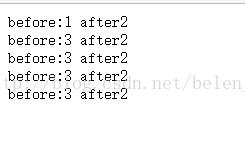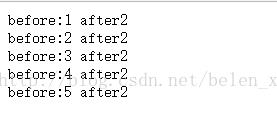目录
- 概述
- 变化情况
- 情况一:
- 情况二:
- 情况三:
概述
unset()经常会被用到,用于销毁指定的变量,但它有自己的行为模式,如果不仔细的话可能会被中文解释给迷惑:
先来看看官方文档的说法:
unset —— unset a given variable
void unset (mixed $var [,mixed $...]);
parameters:
var:The variable to be unset. //要unset的变量
...:Another variable ... //其他需要unset的变量
return Values:No value is returned. //unset不返回值
Because this is a language construct and not a function,it cannot be called using variable functions.
//unset()是语言结构,不是函数,因此不能被函数变量调用,具体参照函数变量。
使用function_exists('unset')返回的false,以此证明unset并不是一个函数,所以无法使用$fun='unset';$fun()的方式调用unset()
It is possible to unset even object properties visible in current context.
//通用环境下unset可以销毁对象或者对象的可见属性(public)
It is not possible to unset $this inside an object method since PHP5
在php5之前unset无法销毁对象中的$this方法
when using unset() on inaccessible object properties,the __unset() overloading method will be called,if declare.
当unset()无法销毁对象中的属性,例如私有属性,保护属性,那么会自动加载对象中的__unset方法。
description:
unset() destroys the specified variables. //unset()销毁指定的变量
The behavior of unset() inside of a function can vary dependiing on what type of variable you are attempting to destroy.
//unset()的行为在函数内部可以根据你所指定销毁的变量类型变化。
变化情况
情况一:
if a globalized variable is unset() inside of a function,only the local variable is destroyed.The variable in the calling environment will retain the same value as before unset() was called.
如果在函数内一个使用global使其全局化的变量,使用unset进行销毁,那么只有局部的变量会被销毁,在调用环境的变量将会保留没有使用unset()销毁之前的调用的变量值。
the example:
<?php
function destroy_foo()
{
global $foo;
unset($foo);
}
$foo = 'bar';
destroy_foo();
echo $foo;
?>
the above example will output:bar
这是官方文档的例子,可能这样还是不太明显,把上面的例子改成下面这样,一切就很清晰了。
<?php
function des(){
global $foo;
$foo='bars';
unset($foo);
echo $foo;
}
$foo='bar';
echo "The globalized variable is unset() inside of a function:";
des();
echo "<br/>";
echo "The variable in the calling environment:";
echo $foo;
上面的例子会返回如下结果:

可以看到函数内echo $foo会得到错误提示该变量没有定义,因为unset将$foo在函数内的局部变量销毁了。
而外部调用环境的$foo仍保留着没有被unset进行销毁,上面官方描述上写了调用环境的$foo将保留的是在使用unset()前的变量值,因此echo出bars,而不是bar。
to unset() a global variable inside of a function,then use the $GLOBALS array to do so.
如果要用unset()销毁函数中的全局变量,应该使用$GLOBALS数组形式
function destroy_foo(){
unset($GLOBALS['foo']);
}
$foo = 'bar';
destroy_foo();
echo $foo;
the above example whill output: Notice: Undefined variable: foo in ...
延伸:
这里可以明确一点,函数内global修饰的变量$var会使其全局化,但和$GLOBALS['var']性质不同,虽然他们都是使用的外部调用环境的$var,但是函数内global $var里保存的只是外部环境调用变量$val的一个指针或者同名引用,而$GLOBALS['var']是外部调用环境$var本身,因此unset在函数内对两者进行销毁会产生上面例子的不同的原因,前者销毁的只是保存同名引用或者指针的变量$var,后者销毁的是外部调用变量$var本身。
情况二:
if a variable that is PASSED BY REFERENCE is unset() inside of a function,only the local variable is destroyed.The variable in the calling environment will retain the same value as before unset() was called.
如果一个被引用的函数在函数内部使用unset()进行销毁,那么只有函数内部的局部变量被销毁,而调用环境变量仍然会保留unset()之前被调用的值。
<?php
function foo(&$bar){
unset($bar);
$bar="blah";
}
$bar='something';
echo $bar."\n";
foo($bar);
echo $bar."\n";
The above example will output:something something
这个和上面global其实很相似,函数内部引用的变量$bar其实保存的是外部环境变量$bar的指针或者说外部变量$bar的引用,因此unset在函数内部销毁的并不是外部环境调用的变量,因此外部环境调用的变量$bar还存在。
情况三:
if a static variable is unset() inside of a function,unset() destroys the variable only in the context of the rest of a function.Following calls will restore the previous value of a variable.
如果是函数内部的静态变量使用unset(),unset()销毁掉函数内部的静态变量,但是下次调用会恢复之前该静态变量的值。
为了更明显,下面的例子进行对比,这里对官方的范例进行了修改对比:
<?php
function fun1(){
static $count=0;
$count++;
echo "before:".$count." ";
$count='2';
echo "after".$count." ";
}
for($i=0;$i<5;$i++){
fun1();
echo "<br/>";
}
output:

下面使用unset:
<?php
function fun1(){
static $count=0;
$count++;
echo "before:".$count." ";
unset($count);
$count='2';
echo "after".$count." ";
}
for($i=0;$i<5;$i++){
fun1();
echo "<br/>";
}
output:

两个对比可以看出,unset只是将函数内部的静态变量进行了销毁,但没有销毁储存在内存里的该静态变量的值,因为在函数内部用static声明的静态变量存储的仅仅是指向内存存储该静态变量的一个指针,因此unset()销毁的时候也仅仅是销毁了该指针,但存储在内存里的静态变量值没有受到影响,因此再次调用该函数的时候,static该变量再次建立了与内存中该变量的指针关系,而上一次调用时unset()之前的该变量值依旧存在,因此会恢复该变量上一次的值,因此$count进行了递增。
以上就是深入理解php中unset()的详细内容,更多关于php unset()的资料请关注自由互联其它相关文章!
